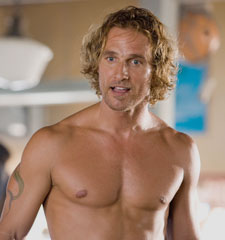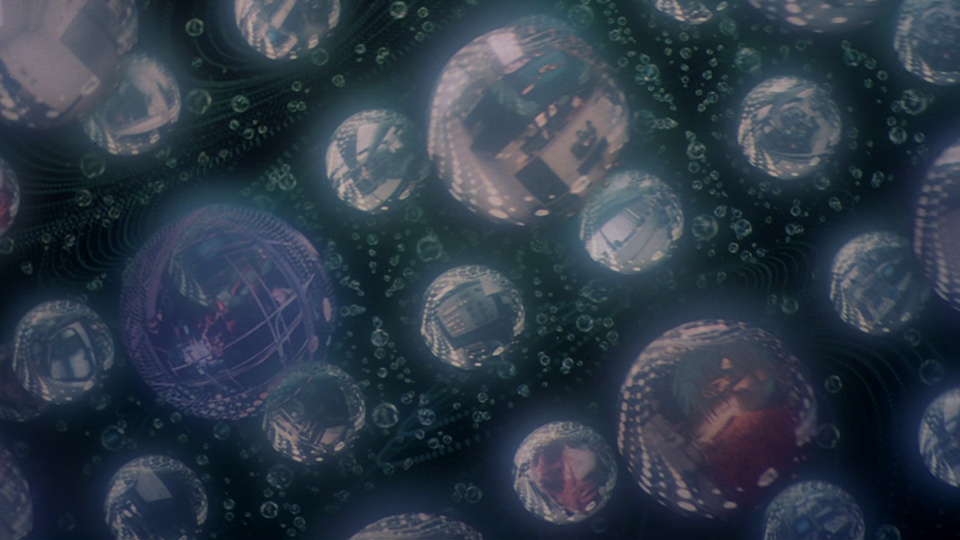The Killer Inside Me
It's impossible to really film The Killer Inside Me. It's a question of medium -- you can't replicate the book's suffocating interior monologue, the puffed-up rant and ramble of a serial killer, because as soon as you dramatize the events in question for a movie camera you make them real in a way that they're not, quite, when they're still sitting on the page. It's the old question of show versus tell.
"I backed her against the wall, slugging, and it was like pounding a pumpkin," Thompson writes. The character's disregard for the humanity of the woman he's killing is manifest in his choice of metaphor — she is vegetable matter. And sheriff's deputy Lou Ford, the narrator of The Killer Inside Me, isn't just a killer but a sociopath. "I wiped my gloves on her body; it was her blood and it belonged there," Ford tells the reader. Some cold shit.
But it's one thing for Lou Ford to tell you that he's beaten a woman to death, and it's quite another for Jessica Alba and Casey Affleck to get up there on screen, he pounding the living hell out of her face, smashing his arm from left to right across the image over and over again, his fists making sickening noises on impact just outside of the frame. On the page, it's literary, even if it makes you ill. You can admire the economy of the language that conveys such brutality, or the sick wit with which Thompson gifts his entirely loathsome protagonist. On the screen, it's visceral. There's a physicality to it. There's the taut grace of Affleck's actions on screen, his attack slicing across your field of vision, and the blunt impacts made by camera placement and sound design. It's an assault on the senses. You're meant to feel this.
Jim Thompson's Lou Ford is a creepy, self-absorbed bastard who thinks of his mild-mannered persona about town as a deliberate game that he plays with the locals, conversing with them in folksy aphorisms and other deliberate banalities to prevent them from comprehending the true extent of (what he believes is) his genius. This kind of man -- frustrated by workaday life and seething with pent-up anger directed at his neighbors -- has become a sort of stock character in American culture, movies in particular. You might see the schlub working behind the counter at Kinko's bristle under the condescending regard of one too many business-professional types and suddenly lunge across the counter to choke the guy to death with his own necktie in a fevered fantasy of sweat and strangulation, only for the setting to suddenly snap back to reality, where the schlub is still standing at the counter at Kinko's, and he nods and says, "Yessir, your copies will be ready at 3 p.m."
There's an element of this in the book, which is eventually revealed to be narrated by a dead man. Sure, it was good enough for Sunset Blvd., but you still get the feeling that The Killer Inside Me itself could just be one long diary entry, a self-aggrandizing episode from the dreamlife of a guy who's going to wake up the next morning and go roll some drunks, take some verbal abuse from his boss, and maybe get a cat out of a tree while fantasizing about fucking and/or beating every lady he sees.
Anyway, the big idea he gets, in both book and film, is to commit a double murder, first conspiring with and then turning on a prostitute who is charmed by his forthright sexual sadism. But there are holes in his plot, and the plan starts to unravel almost immediately. Staying cool, Ford addresses the problem methodically, attempting to cover his misdeeds through more murders. In the process, he destroys not only people who suspect him or can finger him, but also people who love him. In the end, his whole family history goes up in flames.
Winterbottom directs with a great eye for period detail, evoking a sense of 1950s America that's part gritty authenticity, part pulpy kitsch. The dusty oil derricks, the curiously quaint city streets, the old-style gas stations, all have a timeless Edward Hopper look about them. (Tom Bower, who plays the sheriff, has the jawline of a Hopper character.) But the women are something else. Poor Joyce Lakeland (Alba) responds to outright sexual assault with a kiss and whisper: "Don't say you're sorry." And Lou's own girl, Amy Stanton, is ready to stand by him even though she suspects something's terribly wrong. These girls are redneck wet dreams and catnip for darkly dreaming hipsters, and their ceaselessly submissive, exceptionally tolerant behavior may be the only indicator that this story takes place inside the torrid fantasies of a very bad man.
Still, there's no explicit suggestion in the film that we're stuck in the head of an unreliable narrator. Winterbottom has adapted the book faithfully, unambiguously, as a chronicle of events. Long stretches of dialogue are taken verbatim from the original, though the film necessarily lacks the book's detailed picture of Ford's internal life. That means it falls on Affleck's shoulders to put it across, and the way he carries himself here more than adequately suggest the character's arrogance, the ways in which he appreciates his own perceived wiliness as a private practical joke. It's black humor with a deadly punchline. In this terrific, magnetic performance, Affleck is a bit charismatic, somewhat awkward, and utterly despicable, all at the same time. That's where the savagery of the on-screen violence comes in — it's essential that Lou Ford horrify us enough that we never forgot what he's done, even as he turns into the kind of self-assured anti-hero that we might be inclined to root for in a different kind of movie.
Ford comes across here as devious, a bit dim, more than a little out of control, emotionally damaged, and in love with an idea of himself as criminal mastermind that's more fiction than reality. He's ruthless enough, but not especially good at covering his tracks. And when the tide of evidence starts to turn against him, his outwardly easygoing mood turns a bit sour. It's a tour de force, though it's not quite Jim Thompson's character. It's more his shadow, cast across a cinema wall. It's creepy as hell, and I'll take it -- this is likely my favorite Thompson adaptation to date.
Posted by on June 17, 2024 8:06 PM



